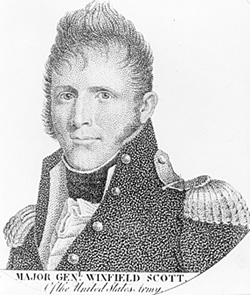 In any discussion of the best American generals of the War of 1812, the names Harrison, Jackson, Brown, and Scott are sure to be mentioned. Audacious, inspirational, successful - these adjectives can be fairly applied to all these men. Three of them ran for the presidency and two succeeded. However, one was a general for nearly five decades, and he left his deep imprint on the entire institution of the US Army. This is a short account of the young Winfield Scott and his growth during America's second war with Britain.
In any discussion of the best American generals of the War of 1812, the names Harrison, Jackson, Brown, and Scott are sure to be mentioned. Audacious, inspirational, successful - these adjectives can be fairly applied to all these men. Three of them ran for the presidency and two succeeded. However, one was a general for nearly five decades, and he left his deep imprint on the entire institution of the US Army. This is a short account of the young Winfield Scott and his growth during America's second war with Britain.
Born near Petersburg, Virginia in 1786, Scott received a superficial education at boarding schools. As many young men on the make, Scott entered the legal profession and was admitted to the Virginia bar in 1806. In an age when vanity and self-promotion were rife, Scott was noted as vain and a bit pompous even as a young man. Sensitive to any slight to his honor, he was arrogant and contentious - characteristics that sometimes led him into difficult situations. He was blessed with a manly bearing, amplified by the uncommon height of six feet, four inches.
At the age of 21, Winfield Scott sought a commission. Perhaps because he displayed the proper political credentials, Jefferson made Scott a captain in the Regiment of Light Artillery. Scott applied himself to the disciplined study of his new profession. He read widely on the many aspects of military art and science: maneuver, organization, engineering, gunnery and drill. Apparently unable to control himself, Captain Scott made public derogatory comments about his superior, General James Wilkinson. For this, a court-martial suspended him from the service for one year.
With the expansion of the Army that marked the preparation for war, Scott was promoted two full grades to lieutenant colonel at the age of 26. As regiments were recruited and mustered into the service, they were sent to Greenbush or the Niagara Frontier or other rendezvous points in preparation for invasions of Upper Canada. With only two companies of light artillery, Scott was ordered to Buffalo. His companies were commanded by Nathan Towson and James Barber. His small battalion moved from Philadelphia to Albany by water and then began the long march westward to Buffalo. Arriving in the first week of October, 1812, Scott reported in to Brigadier General Alexander Smyth and given the task of defending the small naval yard at Black Rock just a couple miles north of Buffalo.
The naval commander at Black Rock, Lieutenant Jesse Elliott, offered Scott an opportunity to join his naval detachment in a raid on two British ships anchored off of Fort Erie on the Canadian side. Elliott proposed to capture these ships. One of them, the Detroit, was the former American ship, the Adams captured only weeks earlier. Every soldier in Scott's small battalion volunteered to go on what was certainly a risky mission. Scott chose sixty troops and placed them under the command of Lieutenant Isaac Roach. Other officers pleaded to go as well but Scott would have none who would outrank Roach. Then Nathan Towson impetuously resigned his commission and Scott allowed him to join the raid as a civilian volunteer. This raid, while only moderately successful, nonetheless inspired confidence in the forces gathering on the Niagara, particularly after the gloom provoked by the loss of Detroit.
Winfield Scott and the War of 1812
- Introduction and Campaign Overview
Queenston
The Battle of Fort George
The Chryler's Field Campaign
The Niagara Campaign of 1814
Battle of Chippawa
Battle of Lundy's Lane
Back to Table of Contents -- War of 1812 #4
Back to War of 1812 List of Issues
Back to MagWeb Magazine List
© Copyright 2005 by Rich Barbuto.
This article appears in MagWeb (Magazine Web) on the Internet World Wide Web.
Other articles from military history and related magazines are available at http://www.magweb.com